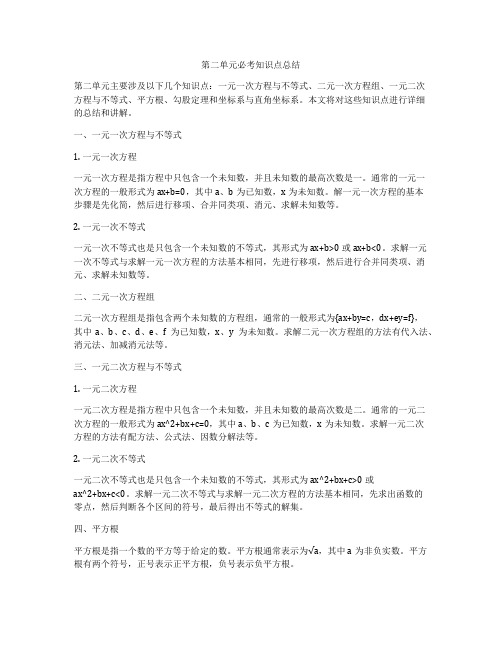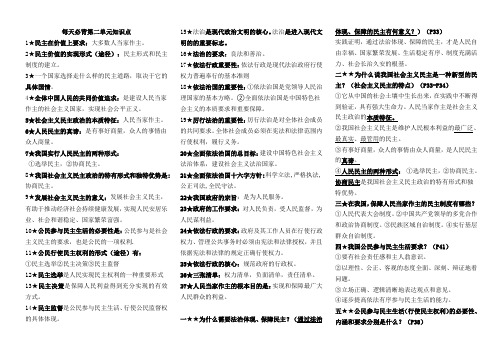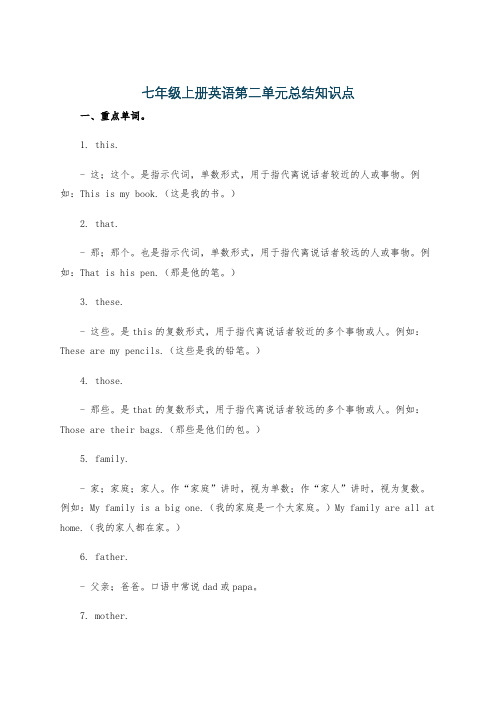第二单元知识点
人教版英语第二单元知识点总结

人教版英语第二单元知识点总结一、重点单词。
1. up.- 作副词,意为“向上”,例如:stand up(站起来);还可表示“在上面;在高处”,如:The kite is up in the sky.(风筝在天空中。
)- 作介词,意为“沿着;顺着”,如:walk up the street(沿着街道走)。
2. dress.- 作名词,意为“连衣裙”,复数形式为dresses。
例如:She has a beautiful red dress.(她有一条漂亮的红色连衣裙。
)- 作动词,意为“给……穿衣服;穿衣服”,常用搭配有dress oneself(给自己穿衣服),dress sb.(给某人穿衣服)。
例如:The mother dresses her baby every day.(妈妈每天给她的宝宝穿衣服。
)3. brush.- 作名词,意为“刷子;画笔”,复数形式为brushes。
例如:a toothbrush (牙刷),a paintbrush(画笔)。
- 作动词,意为“刷;刷净”,如:brush teeth(刷牙)。
4. tooth.- 名词,复数形式为teeth。
例如:brush one's teeth(刷牙)。
5. shower.- 作名词,意为“淋浴;淋浴器(间)”,例如:take a shower(洗淋浴)。
- 作动词,意为“淋浴”,如:He showers every morning.(他每天早晨淋浴。
)6. usually.- 副词,意为“通常地;一般地”,是频度副词,在句中的位置比较灵活,通常位于be动词、助动词、情态动词之后,实义动词之前。
例如:I usually get up at six o'clock.(我通常六点钟起床。
)7. forty.- 数词,意为“四十”,注意其拼写和读音。
例如:There are forty students in our class.(我们班有四十个学生。
三年级英语上册第二单元的必备知识点

三年级英语上册第二单元的必备知识点一、词汇知识点1. 颜色词汇red 红色;红色的green 绿色;绿色的yellow 黄色;黄色的blue 蓝色;蓝色的black 黑色;黑色的brown 棕色;棕色的white 白色;白色的orange 橙色;橙色的这些颜色词汇是第二单元的核心,学生需要熟练掌握它们的发音、拼写及基本用法。
2. 其他常用词汇OK 好;行mum 妈妈(英式英语)mom 妈妈(美式英语)book 书籍bag 书包pencil 铅笔pen 钢笔eraser 橡皮crayon 蜡笔sharpener 卷笔刀schoolbag 书包(更正式的说法)pencil box 铅笔盒这些词汇在日常学习和生活中非常实用,学生应该能够准确识别和运用它们。
二、句型知识点1. 介绍他人This is ... 句型。
例如:“This is Miss Green. 这是格林小姐。
”2. 问候与回答Good morning/afternoon, ... 及其回答。
例如:“Good morning, Miss Green. 早上好,格林小姐。
”Nice to meet you. 及其回答“Nice to meet you, too.”3. 颜色表达I see [color]. 例如:“I see red. 我看到红色。
”Show me [color]. 例如:“Show me green. 给我看看绿色。
”4. 涂色指令Colour it [color]! 例如:“Colour it brown! 把它涂成棕色吧!”5. 询问与回答询问物品归属:“Is this your ...?”及其回答 “Yes, it is./No, it isn't.”询问物品数量:“How many ... do you have?”及其回答“I have ...”。
例如:“How many books do you have? I have three books.”6. 表达喜好I like [物品]. 例如:“I like blue pencils. 我喜欢蓝色的铅笔。
第二单元主要知识点归纳

第⼆单元主要知识点归纳第⼆单元我们周围的空⽓课题1 空⽓⼀.空⽓是⼀种天然资源,混合均匀,相对稳定123、氧⽓的化学性质(很活泼/不活泼?),所以很多物质都能和氧⽓起反应,甚⾄能在氧⽓中燃烧。
4、氮⽓的化学性质(很活泼/不活泼?),所以很多情况下可以⽤氮⽓作其他物质的保护⽓,⽤来隔绝氧⽓或空⽓,防⽌其他物质由于和反应⽽变质。
5、稀有⽓体包括、、、、等⼏种⽓体,稀有⽓体的化学性质(很活泼/很不活泼?),它们(⼀般/绝对)不跟其他物质发⽣化学反应,过去⼈们曾把它们叫做⽓体。
因此稀有⽓体也可以做⽓。
6、物质的物理性质是指物质不需要发⽣化学反应就表现出来的性质,如物质的、、、、、、和是否等。
7.写出空⽓的组成测定实验中红磷和氧⽓反应的⽂字表达式:⼆.空⽓保护:15、空⽓中的有害物质主要有两⼤类:它们是和,其中,有害⽓体⼀般是指、和这三种⽓体。
16、现在全世界出现的三⼤环境问题是、和。
温室效应主要是由于⼤⽓中⽓体的浓度升⾼引起的;臭氧层空洞主要是由于冰箱等设备中释放出来的⽓体散发到⾼空中造成的;⽽酸⾬是由于⼯⼚和汽车尾⽓释放出来的和⽓体溶解于⾬⽔中形成的。
17、空⽓污染的危害:①严重损害的健康,②影响的⽣长,③破坏平衡;④导致全球变暖、臭氧层和等。
18、空⽓污染的防治措施有:加强监测;改善状况;使⽤能源;积极等。
三.纯净物、混合物5.纯净物是由种物质组成的如氧⽓( )、氮⽓( )、⼆氧化碳( )、五氧化⼆磷()和⽔()等是纯净物。
每⼀种纯净物都有⼀个唯⼀的化学符号来表⽰,反过来,能⽤⼀个化学符号来表⽰的都是纯净物。
6.混合物是由种或种物质混合⽽成的,这些物质之间没有发⽣反应,各⾃保持着原来的性质。
如空⽓是由氮⽓和氧⽓等组成的混合物,其中的氧⽓和氮⽓之间没有发⽣反应,能各⾃保持原来的性质。
7.如何区分纯净物和混合物?混合物:⾄少含有两种纯净物,每⼀种纯净物有⾃⼰的化学式,因此混合物⼀般不能⽤⼀个化学式表⽰。
数学第二单元知识点

数学第二单元知识点在数学学科中,第二单元涵盖了多种重要的知识点和概念。
本文将简要介绍这些知识点,并为您提供清晰的解释。
1. 数字和数字系统:数学中的数字是用来表示数量或度量的符号。
数字系统包括自然数、整数、有理数和实数等。
自然数是从1开始的正整数,而整数包括正整数、零和负整数。
有理数是可以表达为两个整数之比的数字,而实数是包含有理数和无理数的集合。
2. 数学运算:数学运算是对数字进行计算和处理的过程。
基本的数学运算包括加法、减法、乘法和除法。
加法是两个数字的求和,减法是一个数字减去另一个数字,乘法是两个数字的乘积,而除法是一个数字除以另一个数字。
3. 数学方程:方程是数学中的等式,它表示两个表达式之间的平衡关系。
方程由等号连接两个表达式,左边称为方程的左侧,右边称为方程的右侧。
解方程意味着找到使得方程成立的变量的值。
4. 几何形状:几何形状是由线段、角、面和体组成的图形。
常见的几何形状包括点、线、线段、角、三角形、四边形、多边形、圆和球等。
几何形状具有不同的性质和特征,通过对其进行研究可以得出许多有趣的结论。
5. 数据和统计:数据分析是数学中的一个重要领域,它涉及收集、组织、解释和推断数据的方法。
统计是描述数据的数学学科,它使用统计学原理和技术来分析和解释数据。
通过统计学,我们可以得出关于数据集的结论和推断。
6. 概率与统计:概率是事件发生的可能性的度量。
统计是收集和分析数据以推断总体特性的过程。
概率和统计紧密相关,它们在许多实际应用领域中发挥着重要作用,如金融、医学和工程等。
这些是数学第二单元的知识点的简要介绍。
通过学习和理解这些概念,我们将能够更好地理解和应用数学原理和技巧。
第二单元必考知识点总结

第二单元必考知识点总结第二单元主要涉及以下几个知识点:一元一次方程与不等式、二元一次方程组、一元二次方程与不等式、平方根、勾股定理和坐标系与直角坐标系。
本文将对这些知识点进行详细的总结和讲解。
一、一元一次方程与不等式1. 一元一次方程一元一次方程是指方程中只包含一个未知数,并且未知数的最高次数是一。
通常的一元一次方程的一般形式为ax+b=0,其中a、b为已知数,x为未知数。
解一元一次方程的基本步骤是先化简,然后进行移项、合并同类项、消元、求解未知数等。
2. 一元一次不等式一元一次不等式也是只包含一个未知数的不等式,其形式为ax+b>0或ax+b<0。
求解一元一次不等式与求解一元一次方程的方法基本相同,先进行移项,然后进行合并同类项、消元、求解未知数等。
二、二元一次方程组二元一次方程组是指包含两个未知数的方程组,通常的一般形式为{ax+by=c,dx+ey=f},其中a、b、c、d、e、f为已知数,x、y为未知数。
求解二元一次方程组的方法有代入法、消元法、加减消元法等。
三、一元二次方程与不等式1. 一元二次方程一元二次方程是指方程中只包含一个未知数,并且未知数的最高次数是二。
通常的一元二次方程的一般形式为ax^2+bx+c=0,其中a、b、c为已知数,x为未知数。
求解一元二次方程的方法有配方法、公式法、因数分解法等。
2. 一元二次不等式一元二次不等式也是只包含一个未知数的不等式,其形式为ax^2+bx+c>0或ax^2+bx+c<0。
求解一元二次不等式与求解一元二次方程的方法基本相同,先求出函数的零点,然后判断各个区间的符号,最后得出不等式的解集。
四、平方根平方根是指一个数的平方等于给定的数。
平方根通常表示为√a,其中a为非负实数。
平方根有两个符号,正号表示正平方根,负号表示负平方根。
五、勾股定理勾股定理是指直角三角形中,斜边的平方等于两个直角边的平方和。
勾股定理的数学表达式为a^2+b^2=c^2,其中a、b为直角边的长度,c为斜边的长度。
二年级数学第二单元知识点归纳

二年级数学第二单元知识点归纳
一、加法。
1. 两位数加两位数不进位加法的计算方法:相同数位对齐,从个位加起,个位相加的和写在个位上,十位相加的和写在十位上。
2. 两位数加两位数进位加法的计算方法:相同数位对齐,从个位加起,个位相加满十,向十位进 1。
二、减法。
1. 两位数减两位数不退位减法的计算方法:相同数位对齐,从个位减起,个位相减的差写在个位上,十位相减的差写在十位上。
2. 两位数减两位数退位减法的计算方法:相同数位对齐,从个位减起,个位不够减,从十位退 1 当 10,和个位上的数合起来再减,十位上的数减去退位的 1 后再减。
三、连加、连减和加减混合。
1. 连加、连减的计算顺序:按照从左到右的顺序依次计算。
2. 加减混合的计算顺序:有括号的先算括号里面的,没有括号的按照从左到右的顺序依次计算。
四、解决问题。
1. 求“比一个数多几的数是多少”,用加法计算。
2. 求“比一个数少几的数是多少”,用减法计算。
二单元每天必背知识点

每天必背第二单元知识点1★民主在价值上要求:大多数人当家作主。
2★民主价值的实现形式(途径):民主形式和民主制度的建立。
3★一个国家选择走什么样的民主道路,取决于它的具体国情。
4★全体中国人民的共同价值追求:是建设人民当家作主的社会主义国家,实现社会公平正义。
5★社会主义民主政治的本质特征:人民当家作主。
6★人民民主的真谛:是有事好商量,众人的事情由众人商量。
7★我国实行人民民主的两种形式:①选举民主,②协商民主。
8★我国社会主义民主政治的特有形式和独特优势是:协商民主。
9★发展社会主义民主的意义:发展社会主义民主,有助于推动经济社会持续健康发展,实现人民安居乐业、社会和谐稳定、国家繁荣富强。
10★公民参与民主生活的必要性是:公民参与是社会主义民主的要求,也是公民的一项权利.11★公民行使民主权利的形式(途径)有:①民主选举②民主决策③民主监督12★民主选举是人民实现民主权利的一种重要形式13★民主决策是保障人民利益得到充分实现的有效方式。
14★民主监督是公民参与民主生活、行使公民监督权的具体体现。
15★法治是现代政治文明的核心。
法治是进入现代文明的的重要标志。
16★法治的要求:良法和善治。
17★依法行政重要性:依法行政是现代法治政府行使权力普遍奉行的基本准则18★依法治国的重要性:①依法治国是党领导人民治理国家的基本方略。
②全面依法治国是中国特色社会主义的本质要求和重要保障。
19★厉行法治的重要性:厉行法治是对全体社会成员的共同要求。
全体社会成员必须在宪法和法律范围内行使权利,履行义务。
20★全面依法治国的总目标:建设中国特色社会主义法治体系,建设社会主义法治国家。
21★全面依法治国十六字方针:科学立法,严格执法,公正司法,全民守法。
22★我国政府的宗旨:是为人民服务。
23★政府的工作要求:对人民负责,受人民监督,为人民谋利益。
24★依法行政的要求:政府及其工作人员在行使行政权力、管理公共事务时必须由宪法和法律授权,并且依据宪法和法律的规定正确行使权力。
第二单元:知识点总结

课题1空气1.“测定空气中氧气的含量”实验现象、结论、及文字表达式【实验现象】①红磷燃烧放出热量,产生大量的白烟。
②冷却后打开止水夹,烧杯中的水进入集气瓶约占集气瓶瓶内空气总体积的1/5。
【实验结论】氧气约占空气体积1/5。
磷++ O2【思考】(1水?答:防止燃着的红磷溅在集气瓶上,将集气瓶炸裂。
让P2O5溶于水中。
(2)为什么点燃的红磷要立即伸入集气瓶中?答:防止白烟污染空气。
(3)水为什么会进入集气瓶中?实验原理解释:利用足量的红磷在密闭的容器中燃烧,耗尽了集气瓶中的氧气,生成固体五氧化二磷;燃烧停止,温度降低后,瓶内压强减少;当打开弹簧夹时,烧杯中的水在大气作用下,流进集气瓶,增补了空气中氧气的体积2.在实际操作中,水面上升的体积会明显小于集气瓶总体积1/5 , 试分析可能的原因:及集气瓶内剩余气体具有什么性质?①.装置漏气。
②.红磷的量不足,氧气没有消耗完。
③.装置没有冷却到室温就打开止水夹。
④.导管内事先未装满水【剩余气体具有什么性质】难溶于水,不能燃烧也不支持燃烧,3思考要使实验成功,对药品,对装置的选择应满足什么要求?【对药品的要求:】.①能在空气中燃烧②只与空气中的氧气反应③燃烧产生最好是固体【对装置要求】:①气密性良好4:能否用蜡烛或木炭代替红磷做实验?不能,因为蜡烛或木炭燃烧生成了气体,使集气瓶内压强变化不大。
5.空气的组成各气体积分数?氮气78%氧气21%二氧化碳0.03%稀有气体0.94%水蒸气及其他气体杂质0.03% 6.能否用木炭、硫、镁、细铁丝代替红磷做实验?不能,因为木炭、硫燃烧生成了气体,(但可以想办法吸收产生的气体)。
镁不仅与氧气发生反应还可与空气中的氮气和二氧化碳反应。
细铁丝在空气中不能燃烧。
7.空气污染的原因和空气被污染的危害及空气污染的防治(课本30页)(1).空气污染的原因:随着工业的发展,排放到空气中的有害气体(主要是硫的氧化物及氮的氧化物和一氧化碳)和烟尘对空气造成了污染。
语文第二单元的知识点归纳总结

语文第二单元的知识点归纳总结一、文学常识1. 作者背景:了解本单元课文作者的生平、创作背景以及其作品风格。
2. 作品体裁:掌握不同文学作品的体裁特点,如诗歌、散文、小说等。
3. 文学流派:熟悉各个时期文学流派的特点及其代表作家。
二、课文内容理解1. 主题思想:把握每篇课文的中心思想,理解作者通过作品表达的情感和观点。
2. 情节梳理:梳理课文的情节发展,理解事件的起因、经过和结果。
3. 人物分析:分析课文中的主要人物,理解其性格特点和在故事中的作用。
三、语言知识1. 词汇积累:学习课文中的生词、成语以及特殊用法的词语。
2. 修辞手法:识别并理解课文中使用的比喻、拟人、排比等修辞手法。
3. 句式结构:分析课文中的复杂句式,理解其表达效果。
四、阅读技巧1. 快速阅读:掌握快速阅读技巧,提高阅读效率。
2. 深度阅读:通过深度阅读,理解文本的深层含义。
3. 批判性阅读:培养批判性思维,对课文内容进行客观分析。
五、写作技巧1. 文章结构:学习如何构建文章的开头、正文和结尾。
2. 语言表达:掌握如何使用恰当的词汇和句式来表达思想。
3. 创意写作:鼓励学生发挥创意,进行个性化的写作练习。
六、文化素养1. 传统文化:了解课文中涉及的传统文化元素,如节日、习俗等。
2. 历史背景:掌握课文所反映的历史背景,理解其对作品的影响。
3. 社会现象:分析课文中反映的社会现象,提高社会责任感。
七、思维能力1. 逻辑推理:通过课文学习,提高逻辑推理能力。
2. 批判性思维:培养批判性思维,对课文内容进行多角度分析。
3. 创新思维:鼓励学生在理解课文的基础上,进行创新性思考。
通过以上七个方面的归纳总结,我们不仅能够对语文第二单元的知识点有一个全面的把握,还能在阅读和写作中运用这些知识点,提高我们的语文素养和思维能力。
六年级上册第二单元英语知识点

六年级上册第二单元英语知识点一、重点单词。
1. 交通工具类。
- on foot步行。
- by bike骑自行车。
- by bus乘公共汽车。
- by train乘火车。
- by plane乘飞机。
- by ship乘船。
- by subway乘地铁。
2. 交通规则类。
- stop停。
- wait等。
- go走。
3. 其他相关单词。
- traffic交通。
- traffic lights交通灯。
- traffic rules交通规则。
二、重点短语。
1. 表示交通方式的短语。
- take the No.57 bus乘57路公共汽车。
- slow down慢下来。
2. 与交通规则相关的短语。
- pay attention to注意。
三、重点句型。
1. 询问交通方式。
- How do you come to school?你怎么来上学的?- 回答:I come on foot/by bike/by bus...我步行/骑自行车/乘公共汽车来的。
2. 描述交通规则。
- Slow down and stop at a yellow light.黄灯亮时减速并停下来。
- Stop and wait at a red light.红灯亮时停下来等待。
- Go at a green light.绿灯亮时走。
3. 表达应该做某事(与交通规则相关)- We must pay attention to the traffic lights.我们必须注意交通灯。
四、语法知识点。
1. 一般现在时特殊疑问句(询问交通方式)- 结构:特殊疑问词(How)+助动词(do/does)+主语+动词原形+其他?- 例如:How does your father go to work?你爸爸怎么去上班?- 在一般现在时中,当主语是第三人称单数(he/she/it等)时,助动词用does,动词用原形;当主语是第一、二人称及复数时,助动词用do。
六年级道德与法治下册第二单元必背知识点

六年级道德与法治下册“第二单元爱护地球共同责任”必背知识点一、地球——我们的家园1. 地球的重要性:地球是宇宙中孕育生命的蓝色星球,是人类唯一的家园。
地球为人类生活提供了所需的空间、环境和资源。
2. 地球的自然环境:地球孕育了人类,提供了人类生存的自然环境。
地球生产充足的食物,奉献丰富的土石和森林等资源,供人类建房造屋、御寒安居。
3. 地球面临的问题:近百年来,随着人口的增长和人类需求的增加,地球越来越不堪重负。
生物赖以生存的森林、湖泊、湿地等正以惊人的速度减少。
煤炭、石油、天然气等不可再生资源因过度开采而面临枯竭。
化石燃料燃烧排放的大量温室气体导致全球气候变暖,地球出现资源短缺、环境污染和生态破坏等问题。
二、环境问题敲响了警钟1. 环境问题的表现:环境污染:包括空气污染、水污染、土壤污染等。
生态破坏:如森林砍伐、湿地退化、生物多样性丧失等。
资源短缺:水资源、矿产资源、土地资源等日益紧张。
2. 环境问题的危害:威胁人类健康:空气污染导致呼吸系统疾病增加,水污染影响饮用水安全。
破坏生态平衡:生物多样性的丧失影响生态系统的稳定性和服务功能。
制约经济发展:资源短缺和环境污染成为制约经济可持续发展的重要因素。
三、我们共同的责任1. 国际社会的努力:世界各国通过签订协定、制定法律等方式来限制人类对地球的伤害。
例如,《巴黎协定》是近200个缔约方在巴黎气候大会上达成的应对全球气候变化的协定。
2. 中国的行动:中国把环境保护列为一项基本国策。
修订后的 《中华人民共和国环境保护法》于2015年1月1日起施行,旨在保护和改善环境,防治污染和其他公害。
3. 个人与社会的责任:保护环境是每个人应尽的义务。
我们要从自身做起,节约用水、用电,减少浪费;积极参与植树造林、垃圾分类等环保活动。
社会各界也应加强环保宣传和教育,提高公众的环保意识和参与度。
四、清洁能源与循环经济1. 清洁能源:清洁能源包括太阳能、风能、水能、生物能等。
【最新版】人教版七年级上册道德与法治第二单元重要知识点总结

【最新版】人教版七年级上册道德与法治
第二单元重要知识点总结
第二单元成长的时空
第四课幸福和睦的家庭
1.家的重要性:
(1)家是生命的居所,是心灵的港湾。
(2)家是我们的第一所学校,父母是我们的第一任老师。
(3)家是代代传承、血脉相连的生活共同体。
(4)家庭是社会的基本细胞。
家庭和睦则社会安定,家庭幸福则社会祥和,家庭
文明则社会文明。
2.如何为建设美好家庭作贡献:
(1)用心体味亲情之爱。
(2)相互关爱、彼此尊重。
(3)传承中华民族传统家庭美德。
(4)共同承担责任,不断提高自我管理能力,增强家庭责任意识。
3.孝亲敬老的原因:
(1)孝亲敬老是中华民族的传统美德。
(2)孝亲敬老是公民的法定义务。
第五课和谐的师生关系
1.教师的重要性:
(1)老师是我们学习和成长的引路人。
(2)教师是人类文明的传承者,对人类数千年文明的延续发挥着重要作用。
(3)教师是履行教育教学职责的专业人员。
2.彼此尊重、教学相长、携手共进,是师生交往理想而美好的状态。
3.建设和谐师生关系,我们的做法:
(1)真诚接受老师的引领和指导。
(2)正确对待老师的表扬和批评。
(3)尊重并适应不同风格的老师。
1。
英语第二单元知识点

英语第二单元知识点
以下是英语第二单元的一些常见知识点:
1. 介词短语:介词短语由介词和其后面的名词、代词或动名词构成。
它们用于表示位置、时间、原因、目的等关系。
常见的介词有in、on、at、for、to、from等。
2. 形容词和副词的比较级和最高级:形容词和副词的比较级通常通过在词尾加-er,最高级通过在词尾加-est或在前面加most来构成。
例如:big(大)- bigger(更大)- biggest(最大);fast(快)- faster(更快)- fastest(最快)。
3. 动词的时态:英语动词有一般现在时、一般过去时、一般将来时等不同的时态。
时态的变化通过动词的词形变化或助动词来表示。
例如:I play(一般现在时);
I played(一般过去时);I will play(一般将来时)。
4. 句型:英语句子通常由主语、谓语和宾语组成,句子结构可以是肯定句、否定句、疑问句等。
句子的基本顺序是主语+谓语+宾语。
例如:She sings a song.(她唱歌。
)
5. 名词的复数形式:英语名词的复数形式通常通过在词尾加-s或-es来构成。
例如:book(书)- books(书籍);box(盒子)- boxes(盒子们)。
这些是第二单元的一些基本知识点,希望对你有所帮助!如果你有其他问题,可以继续提问。
1。
七年级上册英语第二单元总结知识点

七年级上册英语第二单元总结知识点一、重点单词。
1. this.- 这;这个。
是指示代词,单数形式,用于指代离说话者较近的人或事物。
例如:This is my book.(这是我的书。
)2. that.- 那;那个。
也是指示代词,单数形式,用于指代离说话者较远的人或事物。
例如:That is his pen.(那是他的笔。
)3. these.- 这些。
是this的复数形式,用于指代离说话者较近的多个事物或人。
例如:These are my pencils.(这些是我的铅笔。
)4. those.- 那些。
是that的复数形式,用于指代离说话者较远的多个事物或人。
例如:Those are their bags.(那些是他们的包。
)5. family.- 家;家庭;家人。
作“家庭”讲时,视为单数;作“家人”讲时,视为复数。
例如:My family is a big one.(我的家庭是一个大家庭。
)My family are all at home.(我的家人都在家。
)6. father.- 父亲;爸爸。
口语中常说dad或papa。
7. mother.- 母亲;妈妈。
口语中常说mom或mum。
8. parent.- 父(母)亲。
复数形式是parents,表示“父母”。
9. grandfather.- (外)祖父;爷爷;外公。
口语中可称为grandpa。
10. grandmother.- (外)祖母;奶奶;外婆。
口语中可称为grandma。
11. grandparent.- 祖父(母);外祖父(母)。
复数形式是grandparents,表示“(外)祖父母”。
12. son.- 儿子。
13. daughter.- 女儿。
14. cousin.- 堂兄(弟、姐、妹);表兄(弟、姐、妹)。
15. uncle.- 叔叔;伯伯;舅舅;姑父;姨父。
16. aunt.- 姑母;姨母;伯母;婶母;舅母。
17. photo.- 照片。
部编八年级上册语文第二单元教材知识点考点梳理

● 2.夹叙夹议(《回忆我的母亲》)
● (1)概念。
● 作者在记叙事情的同时,穿插了精当的议论。这种写法叫夹叙夹议。
● (2)作用。
● 笔法灵活多变,生动活泼,还可以起到总起、提示、过渡和总结等作用。
● 例如:细读《回忆我的母亲》8-13段找出文中议论性的语句,联系上下文, 理解它们的含义并体会其作用。
4.《美丽的颜色》的体裁是传记, 描写的是两次获得诺贝尔奖的波兰的 著名科学家居里夫人,作者是她的 小女儿艾芙•居里。
● (二)文体知识
● 1.散文。
● (1)散文特点。
● 散文的主要特点是“形散而神不散”。“形散”一是指取材十分广泛、 自由(日月星辰、山川流水、人生百态、历史风云……无一不可);二是指 散文的写作方法灵活多变,叙事、写景、状物……各呈异彩,不受时空限制。 “神不散”指所运用的材料必须为中心思想服务,即以某个线索组织材料, 集中地表现中心思想。散文的选材虽说是无比的自由与广阔,但作者所写 的总是自己感悟至深的生活经验的一部分。
● (1)概念。
● 是一种写作手法,“扬”,是指褒扬、抬高。“抑”,指按下、贬低。作者想褒扬某个人物,却不从 褒扬处落笔,而先是按下,从相反的贬抑处落笔。
● (2)作用。
● 用这种方法,使情节多变,形成波澜起伏,造成鲜明对比,使人物形象更加鲜明,容易使读者在阅读 过程中,产生恍然大悟的感觉,留下比较深刻的印象。
● 第一部分的描写非但没有损害托尔斯泰在读者 心目中的形象,反而收到相反的艺术效果,相与 衬托,欲扬先抑,使托尔斯泰的眼睛给人留下深 刻的印象。
4.教材“补白”------夸张
扩大夸张
第二单元知识点归纳

第二单元多边形面积的计算1. 长方形的面积=长×宽 S=ab正方形的面积=边长×边长 S= a* a平行四边形的底=面积÷高平行四边形的面积 = 底×高 S= a h ==〉平行四边形的高=面积÷底三角形的底=面积*2÷高三角形的面积 = 底×高÷2 S= a h÷ 2 ==〉三角形的高=面积*2÷底梯形的高=面积*2÷(上底+ 下底)梯形的面积 = (上底+ 下底)×高÷2 == 〉梯形的上底=面积*2÷高—下底梯形的下底=面积*2÷高—上底2. 计算平行四边形的面积时,可通过“割补平移”法,把平行四边形转化成长方形,再推导出平行四边形的面积 = 底×高。
3一个平行四边形能分割成两个完全相同的三角形;两个完全相同的三角形能拼成一个平行四边形,拼成的平行四边形面积是三角形面积的2倍,三角形是平行四边形的一半(一个三角形的面积是与它等底等高的平行四边形面积的一半)4如果一个三角形和一个平行四边形的面积相等,其他一个条件相等,那么,另一个条件三角形始终是平行四边形的2倍;平行四边形始终是三角形的一半。
5一个平行四边形分割成两个完全相同的梯形;两个完全相同的梯形可能拼成一个平行四边形,拼成的平行四边形的底等于梯形的上下底的和,高还等于梯形的高。
6.面积计算的步骤:(1)看清图形;(2)用对公式;(3)细心计算;(4)注意单位。
注意点:(1)底和高要对应;(2)计算三角形和梯形的面积不要忘记除以2;(3)单位统一。
7.公顷和平方千米⑴一个社区、校园、广场的面积通常用“公顷”来表示;一个国家、省、市、地区、湖泊和大的土地面积时就要用“平方千米”做单位。
(2)长度单位:1千米=1000米 1米=10分米 1分米=10厘米 1厘米=10毫米(3)面积单位:1平方米=100平方分米 1平方分米=100平方厘米 1公顷=10000平方米1平方千米=1000000平方米=100公顷1个足球场的面积约1公顷.(相邻的面积单位之间的进率为100,除了平方米和公顷是10000)8. 单位之间的换算方法:大单位到小单位:乘以进率或加0,乘以10、100、1000....分别加1个0、2个0、3个0...或小数点右移1位、2位、3位...小单位到大单位:除以进率或减0,除以10、100、1000....分别减1个0、2个0、3个0...或小数点左移1位、2位、3位...9.不规则的图形面积计算(满格的+不满格的/2)⑴求规则图形的面积可以直接数方格;对完全不规则的图形可以借助数方格(整格多少、半格多少)来计算。
- 1、下载文档前请自行甄别文档内容的完整性,平台不提供额外的编辑、内容补充、找答案等附加服务。
- 2、"仅部分预览"的文档,不可在线预览部分如存在完整性等问题,可反馈申请退款(可完整预览的文档不适用该条件!)。
- 3、如文档侵犯您的权益,请联系客服反馈,我们会尽快为您处理(人工客服工作时间:9:00-18:30)。
Unit2 第二单元知识点汇总1. because of 后边加名词或动名词短语because 是连词, 所以后边跟句子因为你的关心, 我发现生活充满了希望。
Because you are concerned about me, I find that life is full of hope.Because of your concern, I find that life is full of hope.因为雨下得很大, 那个男孩穿过树林,回家了。
Because it rained heavily, the boy went back home through the woods.Because of the heavy rain, the boy went back home through the woods.2. Native English speakers can understand each other even if they don’t speak the same kind of English.even if =even though “即使”, 用来引导一个让步状语从句, 后面既可以用陈述语气, 也可用虚拟语气, 但是even if / though 引导的从句不用将来时。
如:Even if it rains tomorrow, we will leave for Beijing.用if, as if, even if填空。
(1) _________ I had money, I wouldn’t buy it.(2) _______ I had money, I would buy it.(3) It looks __________ it is going to rain.(even if 引导让步状语从句; if 引导条件状语从句; as if/ though “似乎是…”引导方式状语从句)注意: (1) even if (= even though): in spite of the fact; no matter whether 即使; 尽管是连词词组, 用来引导让步状语从句; 若主、从句皆表示将来情况, 从句中可用一般现在时代替将来时。
(2) even if 从句所说的不那么肯定。
even though 从句是事实。
e.g: Even if he is poor, she loves him.(=He may be poor, yet she loves him.)(Even) though he is poor, she loves him.(= He is poor, yet she loves him.)When talking to a friend over the telephone, you feel that you are close __B_____ the actual distance is not shortened.A. butB. even ifC. soD. because3. come up 上来, 走近; 发芽; 被提出; 升起①A child came up to me and showed me the way to the station.②the sun comes up in the east.③New shoots of bamboo will come up from around the roots of the old ones.④Y our question came up at the meeting.come about 出现; 发生come across 偶然遇到;被理解come around 恢复; 还原; 改变某人的意见或立场come down 下降;崩塌;传承;come out 成为众所周知; 发行或发表;come over 过来; 偶然拜访come up with 提出;想出;找到The doctor came up with a cure for the disease.4. So why has English changed over time?那么, 英语在一段时间里为什么会起变化呢?over 贯穿, 经过(一段时间)e.g. Over the years, he has become more patient. 经过这些年, 他变得更有耐心。
周末她会来杭州。
She will come to Hangzhou over the weekend.圣诞节时你在家吗?Will you stay at home over Christmas?over 超过(=more than), 再三(again)over 2 minutes over and over5. It was based more on German than the English we speak at present.当时的英语更多的是以德语为基础的,而现代英语不是。
1) base v.意为“以……为根据, 把基础设在……”, 常构成短语base sth. on/upon sth。
如:这部小说是以事实为根据的。
This novel is based on fact.[拓展]base还可用作名词, 意为“底部, 基地, 基础”等。
2) more…than… 是…而不是…;与其说…不如说…; 中间接相同成分。
He is more a friend than a teacher.与其说他愚蠢不如说他懒。
He is more lazy than stupid.扩展: more than 不仅仅; 多于; 十分e.g. He is more than a teacher in our school.He made more than ten friends in this club.She is more than beautiful.rather than 而不是; less than少于;other than 除……之外3) presentadj.当前的, 现在的(作前置定语)Can you tell us something about the present situation?出席的, 在场的(作表语或后置定语)Our teacher was present at the meeting.All the people present agree to my plan.n.目前, 现在; 礼物I can’t spare time because I am busy at present.What present did you receive from your parents?at present: now; at this time/moment她现在很忙, 不能跟你谈话。
She’s busy at present and can’t speak to you.vt.赠与, 赠给予, 给, 提出present sb. with sth.或present sth. to sb.把…交给, 颁发, 授予如:Mother presented a gift to me just now6. Shakespeare made use of a wider vocabulary than ever before.莎士比亚使用了比以往任何时候更为广泛的词汇量。
make use of 利用, 使用make good / full use of 充分使用make no use of sth. 没有利用We could make good use of our resources.我们应该充分利用好我们的资源。
每一分钟都应该很好地利用。
Every minute should be made good use of.我们应该充分利用时间学习。
We should make good use of time to study.[拓展]make构成的常见短语: make of,make from 通常用于被动语态,构成be made of, be made from 都表其中be made of 表示在产品中能够看出原材料; be made from 表示在产品中看不出原材料。
make up 编写, 编造;和解make up of 由……组成/构成;make up for 弥补, 补偿make out 理解, 弄懂; 看清, (勉强)辨认出; 假装, 装成make into 制成……make it 成功, 办成; 及时赶到“由……制成”。
7. the number of/ a number ofthe number of “…….的数目”, 接可数名词复数, 其后谓语动词用单数。
The number of students in our school___ increased over the years.a number of 许多, 大量(后接复数名词), 其后谓语动词用复数。
(a great number of /a large number of )A number of teachers ____on leave.The number of people invited _____fifty, but a number of them ___ absent for different reasons.A. were; wasB. was; wasC. was; wereD. were; were注意: 只能修饰可数名词的a large/ great/ good number of, a good/ great many, dozens of, scores of, quite a few。
只能修饰不可数名词的:a great deal of, a large amount of, quite a little, a large sum of既可修饰可数也可修饰不可数名词的:plenty of, a lot of, lots of, a large quantity of8. such as & for examplesuch as 用来列举事物,置于所列举事物与前面名词之间,其后不用逗号,直接跟列举事物。
He can speak four languages, such as English and French.我喜欢各种各样的水果,例如,香蕉,苹果、橘子。
I like all kinds of fruits, such as banana, apple and orange.for example: 用来举例说明,其前面多有逗号隔开, 其位置比较灵活,可位于句首, 句中或句末。
